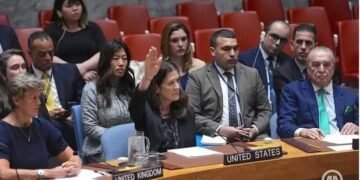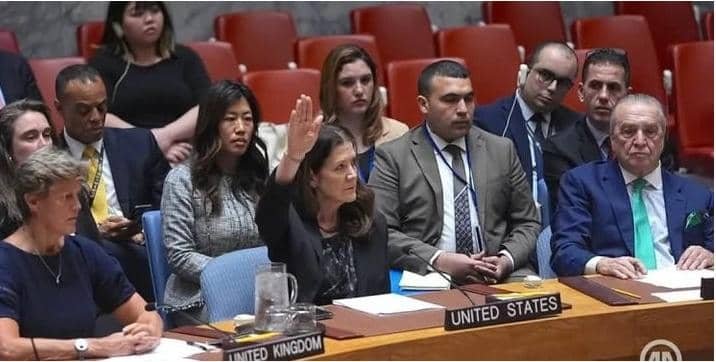By Ononye VC
The United States has once again vetoed a United Nations Security Council resolution calling for an immediate and unconditional ceasefire in Gaza.
According to reports,this marks the fifth time the US has blocked similar efforts since the Israel-Gaza war reignited in 2023.
The draft resolution, introduced by Slovenia on behalf of 10 non-permanent Security Council members, received 14 out of 15 votes in support.
Algeria, Denmark, Greece, Guyana, Panama, Pakistan, the Republic of Korea, Sierra Leone, Somalia, and Slovenia co-sponsored the resolution.
The text cited the worsening humanitarian crisis in Gaza, warning of famine risks and urging respect for international humanitarian and human rights laws.
US Charge d’Affaires Dorothy Shea defended Washington’s veto, stating the draft was unacceptable “for what it says, what it omits, and how it was introduced.”
She accused Hamas of rejecting ceasefire proposals and reiterated the US position that Israel has a right to defend itself.
Shea also criticized the UN for not officially designating Hamas as a terrorist group.
“This resolution ignores Israel’s security needs and therefore is a non-starter,” Shea declared before the vote.
The veto blocks the UN from enforcing a ceasefire, despite overwhelming support among Security Council members and growing international outcry.
The four earlier US vetoes occurred in October and December 2023, as well as in February and November 2024.
In each case, the US stood isolated in its rejection, often citing Israel’s right to self-defense as justification.
Human rights groups and humanitarian agencies have warned of unprecedented suffering in Gaza, with the war causing food shortages, infrastructure collapse, and mass displacement.
Observers argue that repeated US vetoes are undermining the credibility of the Security Council and prolonging the conflict.
Slovenia, speaking for the co-sponsors, described the resolution as urgent and necessary to address humanitarian suffering.
They emphasized that the proposed ceasefire was unconditional and permanent, aimed solely at stopping the violence and enabling aid delivery.
Despite international efforts, the United States’ veto power has proven a major obstacle to coordinated global action.
Critics argue the US is prioritizing its alliance with Israel over its commitment to international law and humanitarian principles.
Supporters of the resolution described the humanitarian crisis in Gaza as catastrophic and urged immediate international intervention.
UN officials have described Gaza as on the verge of famine, with access to medical care, clean water, and shelter deteriorating daily.
Global protests have erupted in response to the war, with demonstrators demanding an end to hostilities and condemning perceived double standards in US foreign policy.
Analysts suggest the US stance could further isolate it diplomatically, especially among Arab and Global South nations.
The repeated use of vetoes on Gaza-related resolutions has ignited debate within the UN on reforming the Security Council’s veto structure.
According to UN sources, more than 35,000 Palestinians have been killed or wounded since hostilities escalated in October 2023.
A significant number of the victims are women and children, according to reports from relief organizations.







































